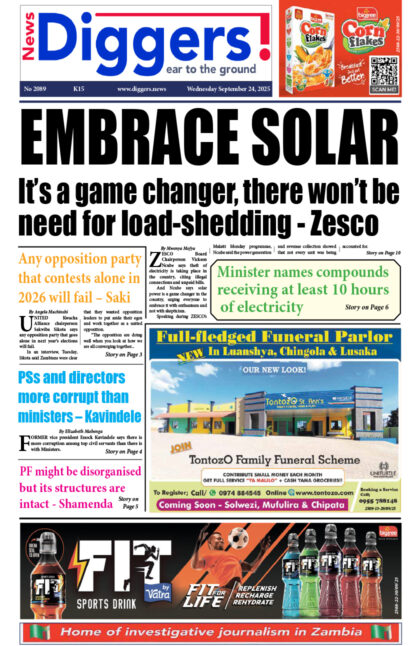Serious unrest is likely to break out in Zambia when the Constitutional Court delivers a verdict on whether President Edgar Lungu is eligible to stand for another term in office in the 2021 general election, predicts the Economist Intelligence Unit.
And EIU predicts that the Constitutional Court is likely to rule in Lungu’s favour since the President is the appointing authority.
Meanwhile, EIU has retained its 2017 forecast that should President Lungu stand in 2021, he will emerge victorious because the opposition UPND seems without the direction needed to fully exploit divisions in the ruling party.
In their Zambia Country Report for January 2018, the EIU also stated that this country faced substantial threats to political stability in 2018-22 due to political intolerance under President Lungu.
“Zambia will face substantial threats to political stability in 2018-22. Much of this stems from what is for Zambia an unusual degree of social division and political intolerance under the presidency of Edgar Lungu. Amid widespread perceptions of worsening corruption and concerns that Zambia is descending into authoritarianism, tensions with the opposition will be acute. In particular, a deep-seated mistrust between Mr Lungu, and the leader of the opposition United Party for National Development (UPND) is unlikely to heal, despite “peace talks” brokered by the Commonwealth, a multilateral organisation, given the absence of any common ground over the validity of the 2016 election—the key sticking point. Over the longer run, there are several potential flashpoints where this animosity stands to spark serious turbulence. For example, serious unrest is likely to break out when the Supreme (Constitutional) Court delivers a verdict on whether Mr Lungu should be eligible to stand for another term in office in a 2021 general election; the announcement date is unspecified,” read the report.
And EIU predicted that the ConCourt was likely to rule in President Lungu’s favour.
“If another term is deemed unconstitutional, Mr Lungu has himself publicly warned of chaos. Likewise, this clear politicisation of the legal process implies that a ruling declaring him able to stand again will now be viewed as tainted by the opposition, who already reject the idea of him having another term. If the ruling goes against Mr Lungu, disturbances could be severe enough to prompt political crisis—this is now a real downside risk —but as the president appoints Supreme (Constitutional) Court judges, such a verdict is unlikely,” read the report.
“Any related unrest is likely to be in the form of opposition protests, potentially involving low-level violence. The 2021 election will be another volatile period, during which the government will look to aggressively narrow the political space. If disorder becomes widespread, as is likely, we expect extra security powers to come into force, as they did for three months in 2017. On the one hand this would act as a mechanism for bolstering overall stability; on the other it would reinforce perceptions that Zambia is staggering into autocracy and deepen underlying social tensions.”
Meanwhile, EIU insisted that President Lungu was poised for victory if he stood in 2021.
“The next presidential and legislative elections are due in August 2021. Assuming Mr Lungu is deemed eligible to stand again, the PF will be streamlined to fit around his ambitions for another term ahead of the 2020 nominations, whereby influential (and usually old-guard) competitors will be expelled or opt to leave. But this will come at a cost, as all PF politicians that have left his administration, either on their own volition or after being fired, have done so while exposing official mismanagement. This is no coincidence: given that corruption is a deep-seated public concern—and for good reason—citing it is a means by which ambitious politicians can begin afresh, in opposition, with a powerful campaigning message at their disposal. As the PF shake-up continues there will probably be similar allegations and the associated bad press stands to cause damage at the polls,” read the EIU report.
“Standing to gain from all this is the National Democratic Congress—a new party founded by Chishimba Kambwili, an exPF minister expelled by Mr Lungu in mid2017— which is already making inroads within the ruling party’s Copperbelt heartland on an anti- corruption platform. If key PF members switch over to this new force, it would split votes to the ultimate benefit of the UPND, which is less involved in the region. Even so, the UPND has become relatively timid since fierce crackdowns on its members and leadership in 2017, and now seems without the direction needed to fully exploit such a scenario. Therefore, as things stand, The Economist Intelligence Unit retains its forecast for a Lungu victory in 2021, although this prognosis is at increasing risk.”
EIU also predicted that Zambia would only clinch the IMF bailout package in 2019.
“The government will have recourse to IMF funding eventually, but judging by a rapid build-up in public debt, we now only expect an assistance package to be agreed in 2019, when the government takes a more stringent fiscal line. Some difficult reforms and fiscal austerity measures will be required to secure and maintain IMF backing, even alongside reasonably high copper prices. But without the boost to investor confidence that comes with a programme, Zambia will struggle to access much-needed concessional loans (servicing domestic public debt is hugely costly) and, perhaps most crucially, refinance part of its Eurobond stock on more favourable terms,” read the report.
























